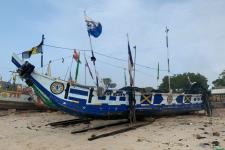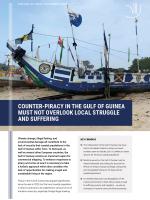Counter-piracy in the Gulf of Guinea must not overlook local struggle and suffering

- The militarization of the Gulf of Guinea may have had an immediate impact on piracy, as recent numbers seem to indicate, but it is unlikely to create security for the local coastal populations.
- Maritime security in the Gulf of Guinea must be viewed holistically, also taking into account the effects of climate change and Illegal, Unreported, and Unregulated fishing on the West African coastal populations.
- Unchecked destruction and degradation of the marine environment in West Africa is likely to lead to suffering, poverty, and migration – as well as increases in maritime crime and illicit economies.
Piracy in the Gulf of Guinea has dropped significantly since its peak in 2020, but the local coastal population in Ghana continues to be subjected to various forms of maritime insecurity, especially foreign illegal trawling. The developments are interlinked, however, as illegal fishing destroys artisanal fishing and forces local fishermen to turn to illicit economies and maritime crime, further threatening fish stocks.
Based on long-term fieldwork and recent interviews with Ghanaian fishermen working on Chinese trawlers, this policy brief examines maritime insecurity as seen from the perspective of West African coastal populations – and what their views may say about maritime security in a time of rapid environmental and climate change.
According to the World Bank, climate change alone is expected to reduce catches in Ghanaian waters by 25 percent by 2050, undermining fishing communities who have little or no recourse to mitigate the situation. The climate disaster is accompanied by rampant Illegal, Unreported, and Unregulated (IUU) fishing conducted by foreign trawlers, a phenomenon that local West African governments are ill-equipped to deal with. These challenges, among others, are undermining local lives and could increase maritime crime and boost illicit economies, which, in turn, could undermine counter-piracy efforts.
Chinese Trawlers off Ghana
Ironically, to many young Ghanian fishermen, seeking employment onboard the Chinese industrial vessels fishing off the coast of Ghana has emerged as the predominant strategy through which they can offset the radical decline in catches in local canoe fishing. Yet the trawling work comes with difficult and unresolved dilemmas: work conditions and pay are poor, and the fishermen take part in unsustainable practices that hurt their colleagues in the artisanal fleet.
The Chinese distant fishing fleet is by far the largest in the world and is heavily subsidized by the Chinese state, including support for new vessels, access to third waters, and fuel subsidies. Chinese controlled trawlers dominate industrial fishing in Ghana too.
90 percent of Ghana’s industrial trawlers are owned by
Chinese companies through shell companies, joint ventures, or subsidiaries.
The regularity of trawler work, however, is often preferred over the stop-and-go nature of local fishing where canoe crews increasingly come back empty-handed, except for an unpaid petrol bill. Local canoes often remain grounded for weeks on end because the operation lacks funds. Yet, the need remains to provide meals, pay bills, and care for families.
As Felix, 34, explained: “The Chinese work is good because you’re working all the time and not just sitting at home. And while you’re away, you’re not using any money, so when you come to take your money, it’s in bulk.”
Abuse and Accidents
On the other hand, fishermen like Felix report unsafe and abusive work environments aboard the Chinese trawlers. Some of the main concerns recorded include the injuries sustained due to working with damaged fishing equipment and a lack of safety measures on board.
“They refuse to change the ropes and the wires, even when they are old and risky. And we don’t have proper boots, only these flat ones, so when we’re below and standing on the ice, you can easily slip and fall and hit your head. We never feel safe when we’re sailing.”
The most dangerous accidents happen precisely because the wires and the hooks that are holding the net are not replaced when they show signs of wear and tear. Kwame, 22, experienced this up close:
“We were working with the net – some of my colleagues even shot it on video – when the wires broke and caught the legs of one of our colleagues. I t swept him away into the water and we couldn’t see him anymore. That is something I will never forget, to see someone I’m working with being killed like that, and there’s no body to bury. That has left a mark on me.”
Another concern is the abuse and disrespectful treatment they receive from the Chinese captains, which often results in physical altercations, including spitting and slapping. Benjamin gave one example:
“One of the Ghanaian sailors grabbed an octopus, but the Chinese captain didn’t like that because it is one of their high-grade fish. The boy was explaining himself to the Chinese captain, using his hands, saying that he works so hard, and asking why can’t he eat the fish he chooses. But the Chinese captain thought he was insulting him and slapped him, and it turned into a fist fight, and they had to be separated.“
The Gulf of Guinea, stretching from Senegal to Angola, has been plagued by piracy and kidnappings in the last decade. In 2020, 130 sailors were kidnapped in 22 separate incidents. To Denmark, and several other European countries, the Gulf of Guinea remains an important region for commercial shipping. From 2022–2026, Danish contributions to maritime security include, among other things, strategy development in capacity building for Ghana’s maritime security sector to enhance responses to piracy and crime at sea. Although piracy remains a threat, it has declined in recent years as a result of enhanced national, regional, and international efforts.
Another concern among the Ghanian fishermen is a general worry about taking part in IUU fishing that damages the marine environment and the operations of their colleagues along the coast. Essentially, they become coconspirators in the ongoing destruction of the future livelihoods of their communities.
“The Chinese go for the red fish close to the shore, because that fish is their high-grade fish. We put out the nets and fish all night. When day breaks, we run back to the deep sea. We, the blacks, worry about it because it’s our brothers who are fishing in those waters and we run over their nets and destroy the business for them. We plead with Chinese captains not to go there. We say this place is not good, let’s go, let’s go. But they push to go there because they want to increase their catch.”
Poisoning the Fish
In a desperate response to the dwindling catches and the destruction created by the foreign industrial fleet, the artisanal fleet too has adopted illegal and unsustainable methods to boost its own declining catches.
Chemicals like Carbide, DDT, and formaldehyde for embalmment of bodies are now in use all along the west coast of Ghana, typically in combination with light fishing. Lights bulbs are lowered into the sea to attract the fish and then the chemicals are introduced into the water to kill them.
Fish caught this way are dead when they are brought into the canoe, often the eyes are bleeding, and the meat is disintegrating. Not only do these fish constitute a health hazard for the consumers, they also bring in less money for the women fishmongers because they ‘don’t taste sweet’, as one fishmonger, Sister Elizabeth, explained:
“It’s not safe for human beings to eat that fish. When they bring it from the sea, you see the meat has changed into a black color from the poison. It’s not sweet. Even when you’re cooking and you’re adding plenty Maggi cubes (seasoning cubes) it will still not taste sweet. People get sick from it. You feel pressure in the stomach.”
Although Sister Elizabeth herself is involved in the local fishmongers’ struggle and mobilization to eradicate the use of chemicals from the industry, her own canoe crew uses carbide to enhance its catch because they cannot afford to come back from the sea empty-handed.
Some fishermen have given up on fishing altogether
and joined the oil smuggling operations, which defrauds
the Ghanian state from tax revenues but still take place in plain sight.
“You see? I campaign to stop it, but I’m involved in it myself. It’s because of business. Unless we use the chemicals, we have no business. I sell the bad fish quickly in the market and take my money. At times I even eat it myself, but I smoke it first to remove the bad taste."
The chemicals used in this type of fishing are hazardous to the environment, marine life and to the local population along the coast. Also, the overall stock of small pelagic species that the local fishermen depend on is severely overfished and in a state of collapse, according to a recent report from USAID/Ghana.
From Fishing to Smuggling
Some fishermen have given up on fishing altogether. Isaac, for instance, like many other young fishermen in Takoradi, has joined the oil smuggling operations. Oil smuggling relies on locally-constructed smaller wooden ships with large hulls. The crew consists of former fishermen who are now jobless.
“You make two weeks’ salary in one day. Just one trip. People are moving into this business since the fishing is going down; that’s where the money is. Right now, I’m working as a mason laying tiles but the moment an oil ship comes in, I’ll drop everything because the money is so much better.”
Nigerian oil tankers waiting on the high seas signal the Ghanaian associates to come and fill up their smaller wooden boats and take the refined oil to shore. As a result of these operations, the Ghanian state is defrauded from tax revenues. The operations take place in plain sight.
“It’s refined oil; you can put It directly into your car. We sell to the filling stations around here. The police will chase you to take their part. But after you pay a bribe, they’ll escort the oil tanker trucks to Kumasi or Accra so that people don’t poke their noses into the business. In Ghana here, everything is settled.”
In conclusion, even if piracy attacks on the international merchant fleet have declined, sustainable improvements in maritime security demand focus on the lack of security for the coastal population in the Gulf of Guinea. The effects of climate change, IUU fishing, and environmental damage are many, serious, and require urgent attention.
First, collapsing fish stocks create food insecurity among one of the poorest segments of the populations who have nowhere else to turn. Second, fishermen lose faith in local governance and authorities when they see police or the navy being incapable of bringing offenders to justice and/or take bribes. Third, studies have shown a link between maritime degradation, declining fish stocks and high-risk migration to Europe, the current route between Senegal and the Spanish Canary Islands being a case in point. Fourth, dwindling catches pressure local fisherfolk to also adopt illegal and unsustainable fishing methods that further aggravate a dire situation. Fifth, some fishermen drift into maritime crime and illicit economies, including oil smuggling, which could undermine long-term security and stability in the region.
The fieldwork data for this brief has been collected in collaboration with Research Assistant Thomas Asare.
DIIS Experts



